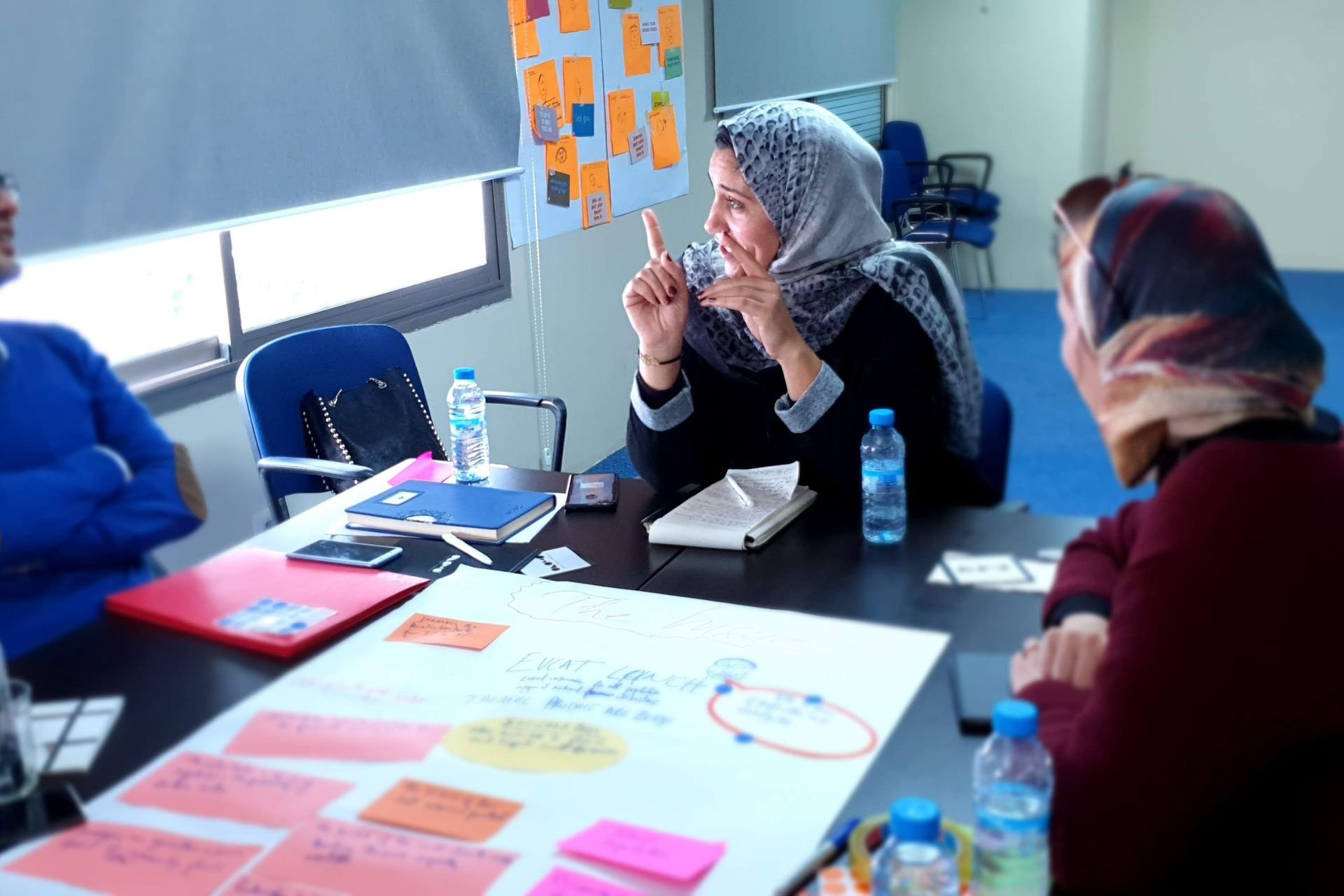
Real-world problems, real collaborations, real transformations
Explore some of the multi-year initiatives and projects we’ve supported across a range of issue areas worldwide to enable systems change.
Electricity innovation lab: accelerating innovation in the U.S. electricity sector
A model of cross-sector innovation to shift an industry from business as usual to sustainability.
📍United States
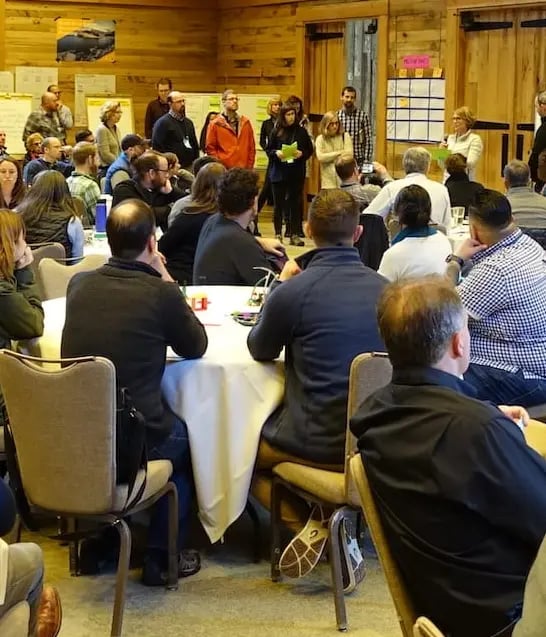
The challenge
The growing need for reinvestment in electricity infrastructure, climate change, an increasing focus on grid resilience, and the changing cost of technologies that produce, deliver, and use electricity are changing the U.S. electricity landscape.
Shifting the electricity sector will require engagement and innovation across traditional institutional boundaries.
The approach
Convened by Rocky Mountain Institute (RMI) and supported by Reos Partners, the Electricity Innovation Lab (e-Lab) brings thought leaders and decision-makers from across the U.S. electricity sector together and helps them identify and undertake transformative initiatives. It enables team members to share learnings, best practices, and analyses, collaborate around key issues or needs, and conduct deep dives into research findings.
The transformation
This multi-year social lab has created a critical structure for engagement and innovation. The structures and processes of the lab are generating new business models, policy approaches, and strategies as well as new beliefs and perspectives.
A diverse, dispersed, resilient, largely renewable electricity future is the key to making the world richer, fairer, cooler, and safer…I’ve been working on these issues for about 40 years, and this is the first time, I think, that such a broad spectrum of thought leaders in the electricity industry has ever been together in one place…I think it’s going to speed up the transition by maybe a decade.
AMORY LOVINS
CO-FOUNDER AND CHAIRMAN EMERITUS
ROCKY MOUNTAIN INSTITUTE
Sustainable fashion collaboration: creating ethical and sustainable fashion in Brazil
A model of a whole-value-chain approach to sustainable production, consumption, and social and economic development.
📍Brazil
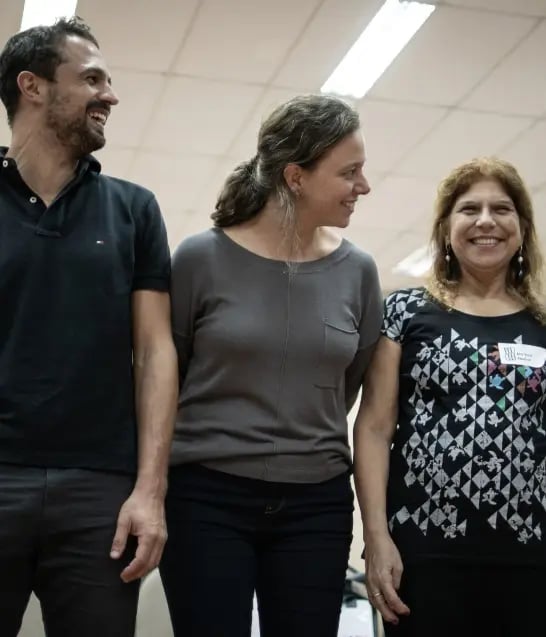
The challenge
The fashion value chain in Brazil, as in other countries, faces social, economic and environmental sustainability challenges. These challenges are related to labour issues, social inequalities, consumption patterns, the product life cycle, quality of education and training, use of technology and the predominant business model.
The approach
Bringing together 40 leaders in Brazil, among them garment workers, retail giants, the public sector, academia, associations and unions, institutes and foundations, international organisations, civil society organisations, media and others, Reos Partners has supported a process in which participants are prototyping initiatives with systemic-level impact focused on the challenges listed above.
The transformation
The results of the Sustainable Fashion Collaboration / Colabora Moda Sustentável include:
- New and strengthened relationships and partnerships between the different stakeholders in the supply chain
- A shared commitment to addressing common concerns such as sustainability, fair working conditions, and reduction of gender, ethnicity and class inequalities in the sector
- Tested solutions for the core challenges, financial mechanisms including the creation of a fund to support SMEs in the fashion industry to survive and thrive
- A resilient platform for collaboration.
- 22 initiatives have been prototyped, of which 9 received seed funding and 3 impact businesses were provided mentoring.
Inclusive insurance innovation lab: improving access to insurance for those who need it most
A model of national innovation and cross- national learning to enable an industry to advance the SDGs and “leave no one behind”.
📍Albania, Ghana, Kenya, Mongolia, Argentina, Morocco, India, Rwanda, Costa Rica, Grenada, Zimbabwe and Zambia
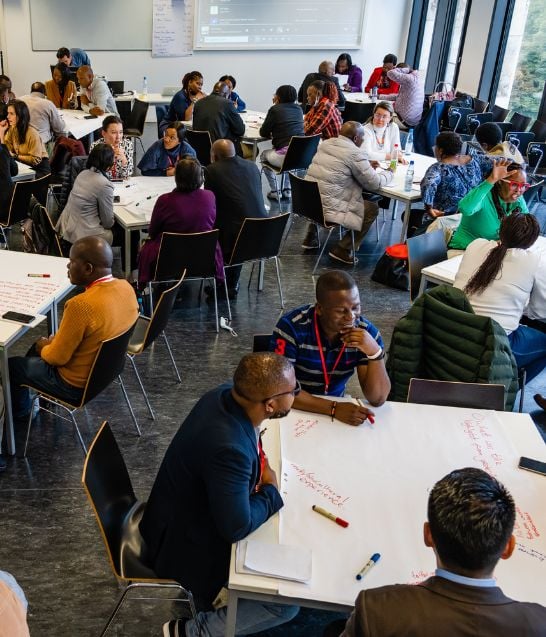
The challenge
Many barriers stand in the way of providing good quality insurance to vulnerable people and businesses, leaving many around the world without access to options that can help them through crisis. The reasons can be found both on the supply and demand sides and may be intensified by the regulatory and policy environment.
The approach
Working with Reos Partners over the last 6 years, the Access to Insurance Initiative has convened national innovation labs in 12 countries across the world with the aim of increasing the uptake of good quality insurance to vulnerable people and businesses. Each country team consists of the regulator, private insurers, NGOs, consumer protection groups and insurance associations.
The lab process has involved national and international dialogues and analysis, innovation incubation, and prototyping. The innovations are implemented at national level, while the cross-national dialogues provide a stimulating space for learning and inspiration across contexts.
The transformation
New products, services, platforms, and policies alongside new relationships, narratives and leadership skills have been developed and knowledge sharing has taken place within and across country teams. The teams have prototyped more than 15 concrete innovations that have increased the resilience of vulnerable people and businesses in the participant countries and examples have been generated that can inspire further action elsewhere.
The most significant outcome in my view is the social capital that has been created which offers a wealth of experience to tap into as we all try in our respective ways and countries to deepen insurance penetration in the lower segment of our market.
III-LAB PARTICIPANT
Emergency aid lab: The roadmap to effective emergency aid
A model of how to catalyze innovation and transform behaviour across an entire sector of similar institutions.
📍United States
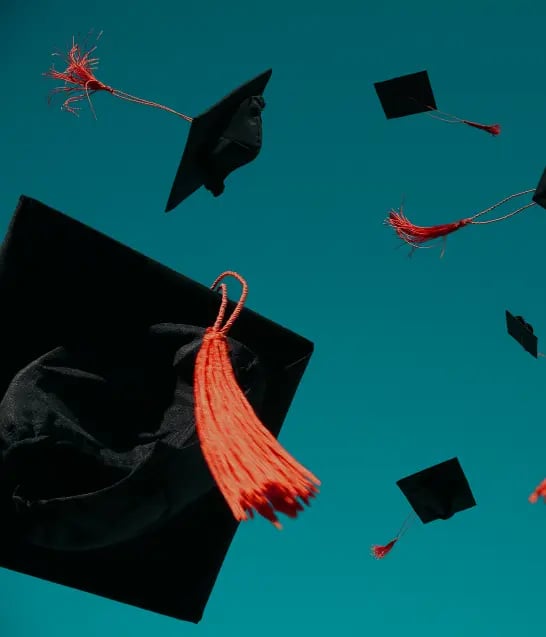
The challenge
It’s increasingly difficult to afford college in the U.S. and for many students, a small, unexpected expense can lead to them dropping out. Several higher education institutions in the U.S. offer some form of emergency aid, but only a few have a robust program that offers the potential for maximum impact on student retention and completion.
The approach
Supported by the Bill & Melinda Gates Foundation, Reos Partners facilitated an Emergency Aid Lab. The lab created a field of practice for effectively providing emergency aid to students to enable them to complete their studies. It provided support to five U.S. colleges to fast-track research, design, and implementation of emergency financial aid innovations on their campuses.
The transformation
Over an 18-month period, more than 100 higher education administrators, faculty, students, and other leaders in the field collaborated, shared learnings, and helped refine best practices to transform informal emergency aid efforts.
The end product is the Roadmap to Effective Emergency Aid, a program that guides higher education leaders in transforming informal emergency aid efforts into a comprehensive program that increases student success. The program is delivered through an interactive, online course, in-person workshops led by Reos Partners, and coaching.
Before we started, our programs were scattered and siloed, not well advertised, and lots of folks didn’t know about the options. We now have a much more comprehensive approach. The process we’re going through with Reos Partners is really building something sustainable.
FRANCISCO VALINES
FINANCIAL AID,
FLORIDA INTERNATIONAL UNIVERSITY
Land reform futures for South Africa
A model of how to build mutual understanding around a contentious issue in a divided society.
📍South Africa

The challenge
Given the colonial and apartheid history of South Africa, land, its use, distribution and ownership have been contentious issues, and action towards land reform a frequent demand. How to enable effective land reform is a question on the minds of many South Africans. The approaches could serve to increase equitable outcomes, food security, and reinforce democratic institutions and processes.
The approach
In order to help the country on a path towards land reform as a tool towards sustainable development, Reos Partners supported the Vumelana Advisory Fund to convene and undertake a transformative scenario process to explore potential futures of land Reform in South Africa.
The process brought together policy makers, traditional leaders, Communal Property Institution (CPI) leaders, activists, business people, academics and consultants and provided a framework within which difficult conversations and debates could productively take place. These conversations led to decision-making about how to adapt to anticipated challenges and opportunities, and how to shape the future of land reform.
The transformation
The four scenarios that were created tell stories of how South Africans might respond to the challenges and uncertainties they face about the future of land reform. The process of creating them led to new relationships between formerly divided players, new understandings of each other’s perspectives, and the emergence of new considerations and approaches.
The scenarios are being referred to in current conversations in Parliament around land expropriation and a number of the scenario participants are working on proposals for supporting expropriation more effectively.
Transformative scenarios for basic education in Brazil
A model of multi-stakeholder dialogue to transform a national institutional system.
📍Brazil
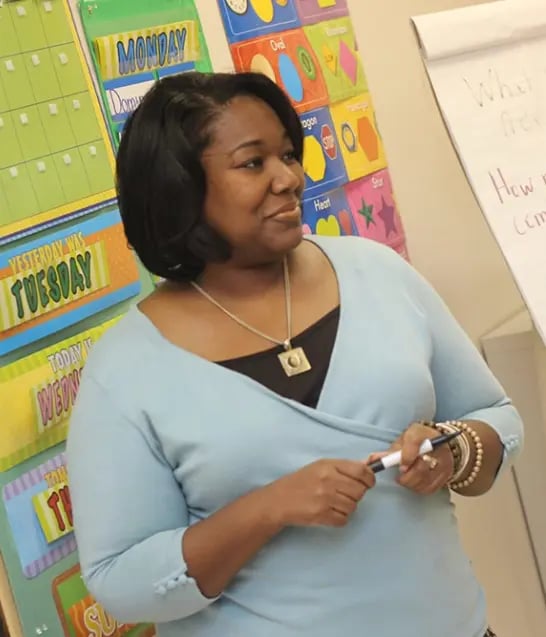
The challenge
Brazil’s basic education system is struggling. Its 50 million students rank between 54th and 60th out of 65 countries on international tests, and grade repetition and drop-out are common. Further, many of the systemic problems in Brazil such as high levels of violence and youth incarceration and continuing gender, race and class inequality have roots in the failing education system.
The approach
This project brought together a scenario team of 41 leaders in the field of education in Brazil to engage in dialogue about the different – and often conflicting – perspectives in order to develop transformative scenarios for the future of basic education in Brazil. Rather than aiming to build a negotiated pact or a common agenda among participants the scenario development process became a meeting point and a place for active listening including exploring conflicts and differences.
The transformation
The scenarios provided new language, an invaluable rhetoric-free focal point, and a precedent of relationship within the sector. The scenarios have been used to enrich and stimulate discussion in many fora including schools and communities, regional and national conferences, and society at large. In doing so it has inspired, stimulated and informed strategies, decisions and actions in the field of education in Brazil.

We welcome a conversation with you
Wherever you are on your systems change journey; we’re happy to support!